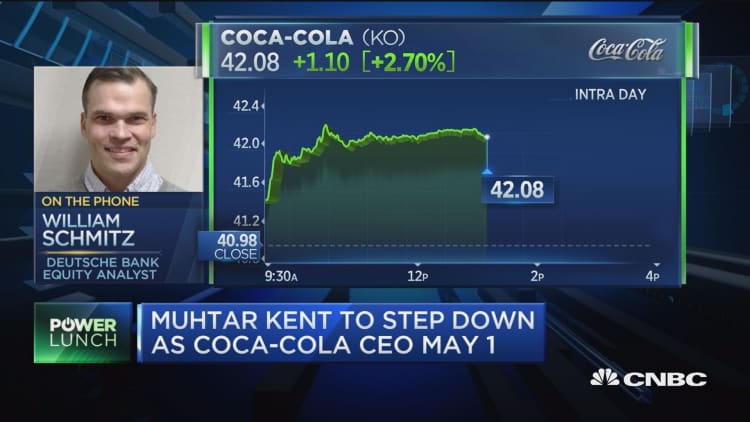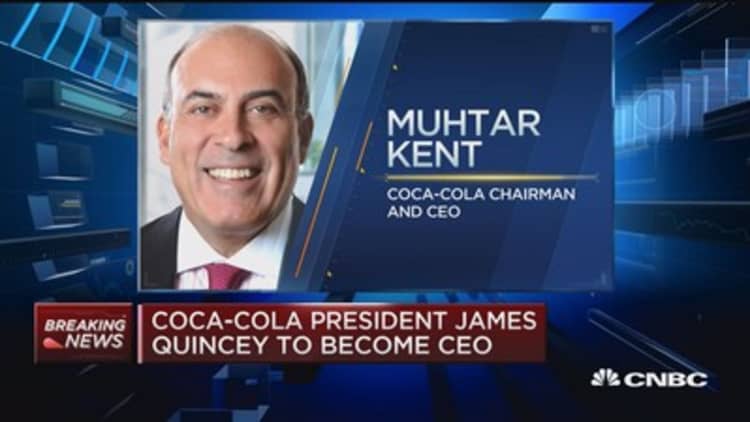


A change in the executive suite at Coca-Cola could result in the beverage giant doing more deals as a way to accelerate revenue and profit growth, analysts said.
Chairman and CEO Muhtar Kent, who has been at the reins since 2008, is relinquishing the top post and will be succeeded by the company's president and chief operating officer, James Quincey, the beverage giant announced Friday. Kent, 64, will remain chairman.
"James Quincey is the right person to lead Coke into the future," said Wells Fargo analyst Bonnie Herzog in a research note. "He will bring a refreshing approach to running the business. Moreover, we tend to believe that given James' background and significant deal experience, he could accelerate Coke's growth even further through stepped-up acquisitions over the next several years."
Quincey, 51, has around 20 years experience at Coke in many different roles around the globe, and helped spearhead some of the bottler transactions that happened in Europe recently as part of a drive to achieve greater scale and efficiency. He was appointed COO in August 2015 and was seen at the time as the being groomed for the CEO spot as the segment presidents were then reporting to him.
Coke, which licenses or owns more than 500 brands worldwide, said its board intends to nominate Quincey to stand for election as a director at the company's next annual shareholders meeting in April.
Yet succession at Coke hasn't always been smooth. For example, there was no clear plan after CEOs Douglas Daft and Doug Ivester left the company. Also, there have been cases when Coke's president and COO was not selected to become CEO; such was the case in 2004 when Steve Heyer was passed over for the job vacated by Daft.
"If you go back in history, usually there's a CEO who gets fired and they have to bring in a new CEO," said Nik Modi, an analyst at RBC Capital. "In this case, you're seeing a much smoother transition."
Analysts said the latest change in Coke's executive suite was generally expected although some had looked for the announcement to be made in 2017. The management changes will become effective May 1.
Coke said it has no plans to appoint a new COO at this time.
"People really like him [James Quincey] within the organization," said Modi. "He's created a very collaborative culture."
Added the RBC analyst, "Since James has been there, the soft drink business has done well relative to Pepsi."
Kent has presided over the company at a challenging time when carbonated soft drink industry sales declined due to sugar and obesity concerns while diet soda lost momentum too. The company also coped with around 2,000 layoffs last year, including jobs at its headquarters in Atlanta.
Analysts are forecasting that Coke's earnings per share in the fourth quarter will decline an average of 12 percent and sales will be essentially flat, according to Thomson Reuters. For the full year, analysts are looking for single-digit growth in revenue and for a slight decline in top-line growth in 2017.
Coke's net revenue for the past three years has been down while PepsiCo has had its own uneven annual growth during the same period.
"Over his [Kent's] tenure you've seen a real secular shift away from carbonated soft drinks, and that's had a huge impact on Coke," said Morningstar analyst Adam Fleck. "The ability to recognize that and invest internationally, invest in noncarbonated brands and understand the nuances of each market ... have been hallmarks for his tenure."
Under Kent, Coke has seen stock returns including dividends of about 8 to 8.5 percent on an annualized basis, according to Morningstar. That means they have trailed the general market but the analyst said given Coke's a lower-risk stock, a return of 7.5 percent is "appropriate."
"The transition in leadership at the company in 2017 will conclude a busy period of transition in Coca-Cola's overall business," said Howard Telford, a beverage industry analyst for Euromonitor International. "The company is working towards a 100 percent refranchised bottling model in North America while refranchising to key anchor bottlers internationally as well, as it seeks to become a more nimble, profitable and less capital-intensive operation."
Also, Coke has made significant investments beyond its core soda business in the last several years, Telford said. Those have included investments in beverage brands in the juice, tea and water categories.
"The challenge for the next leadership team at the company will be ensuring continued sales growth in this new consumer environment," the Euromonitor analyst said. He explained that the new environment is impacting both developed and developing markets and that growth may include opportunities for "targeted brand acquisitions in new, high-value categories."
Coke's stock jumped 2.5 percent Friday. The shares are down more than 1 percent in the past 12 months and in the year-to-date period, while rival Pepsi is up during the same periods.
"As Chairman and CEO, Muhtar has been an excellent steward of Coca-Cola's business over the last eight years and I am thankful for the leadership he has provided to put in place the right vision, strategy and thoughtful succession plan for long-term success," said Berkshire Hathaway Chairman and CEO Warren Buffett, whose company owns about 9 percent of Coke's stock.
Added Buffett, "I know James and like him, and believe the company has made a smart investment in its future with his selection."


